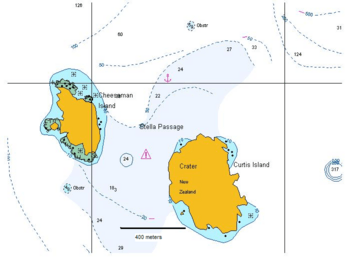Cheeseman Island facts for kids

Cheeseman Island (right) and Curtis Island from north.
|
|

Map
|
|
| Geography | |
|---|---|
| Coordinates | 30°32′12″S 178°34′05″W / 30.53667°S 178.56806°W |
| Archipelago | Kermadec Islands |
| Area | 7.6 ha (19 acres) |
| Administration | |
| Demographics | |
| Population | 0 |
Cheeseman Island is a small, rocky island in the southwest Pacific Ocean. It is a volcanic island, meaning it was formed by volcanoes. This island is about 7.6 hectares big, which is like 18 football fields.
Cheeseman Island is part of the Kermadec Islands. This is a group of islands that belong to New Zealand. They are located about halfway between New Zealand's North Island and the country of Tonga.
The island is named after Thomas Frederick Cheeseman. He was a scientist from the Auckland War Memorial Museum. He visited the island in 1887 on a New Zealand government ship. The island is also partly named after Matthew Cheeseman, who helped map it. Cheeseman Island is very close to Curtis Island and about 20 kilometers south of Macauley Island.
Life on Cheeseman Island
Cheeseman Island is mostly surrounded by steep cliffs. This makes it very hard to get onto the island from the sea. The island is rugged and rocky. There are not many trees or large plants.
Plants on the Island
In the middle of the island, there is a valley. Here, you will find a plant called Cyperus ustulatus. This plant is a type of grass-like plant called a sedge. On the slopes around the valley, you can see other plants. These include Parietaria debilis and Disphyma australe.
Amazing Seabirds
Cheeseman Island is a very important place for birds. It is part of the Kermadec Islands Important Bird Area. This means it is a special spot for seabirds to build their nests and raise their young. Many different types of seabirds breed here.
Some of the seabirds that live on Cheeseman Island are:
These birds fly out to sea to find food. They return to the island to lay their eggs and take care of their chicks. Protecting places like Cheeseman Island helps these seabirds survive.
 | Anna J. Cooper |
 | Mary McLeod Bethune |
 | Lillie Mae Bradford |

